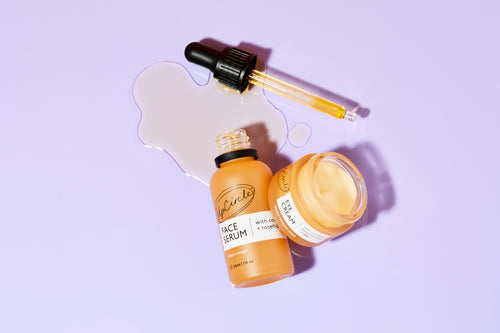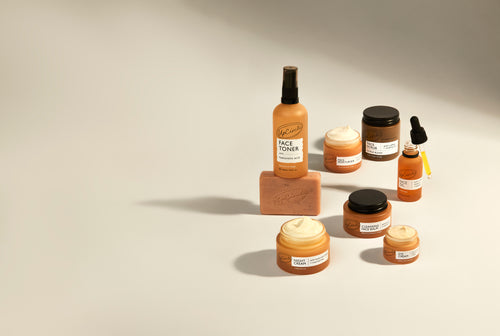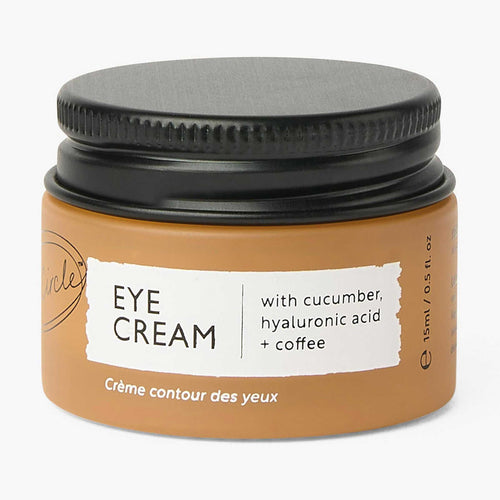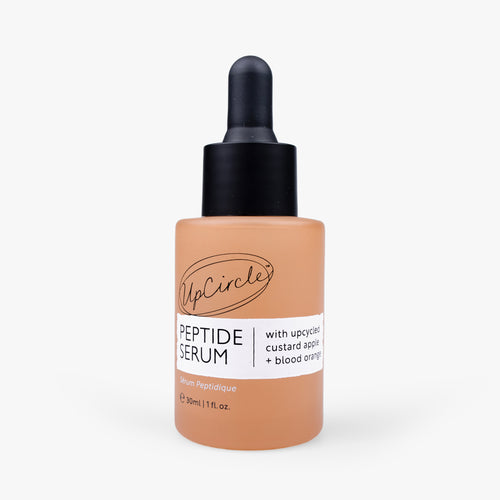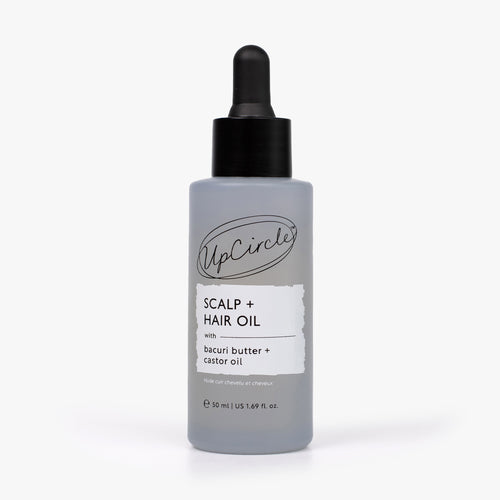Ceramides are becoming increasingly more well-known for their skincare benefits and are taking the skincare industry by storm. Because of this, many brands have started to incorporate them into their products. Hailed for helping to fight against free radicals and damage from external stressors, ceramides are a staple in many skincare routines.
Discover all you need to know about this so-called wonder ingredient, including: what it is, how it can help your skin, if it lives up to the hype and the natural ways that you can increase your skin’s ceramide levels.
What you need to know about ceramides
Ceramides are a type of lipid – naturally-occurring organic compounds – which comprise around 50% of the intercellular stratum corneum lipids. It all sounds very science-y but the stratum corneum is essentially the skin’s connection to the world around us and the skin’s outermost layer, the epidermis.
They play a huge role in helping to keep the natural skin barrier healthy and working as it should to protect the skin from damage. This is because ceramides hold together the skin cells, while also protecting them from external stressors in the environment such as free radicals.
When it comes to skincare, ceramides are often the star of the show with many skincare routines focusing on how to reap the benefits of ceramides. This can be achieved both by using ceramide skincare products or products containing ceramide-rich ingredients.
Ceramides benefits for skin
From improving the skin’s complexion to boosting hydration and maintaining the natural skin barrier, ceramides are hailed for their skincare benefits. While many people may want to use ceramides to improve the appearance and health of their skin, it is important to accept the skin you have and value it for helping to protect you.
We’ve rounded up the main benefits of ceramides that you can expect from using ceramide-rich products in your skincare routine.
Helps to hydrate the skin
As ceramides are lipids, they play an essential role in maintaining the water permeability barrier function of the skin – in other words, preventing water from escaping. This locks in the moisture in your skin, helping to keep the skin hydrated, happy and healthy.
Maintains the natural skin barrier
The skin barrier is the skin’s first-line defence against environmental stressors and free radicals, meaning it plays a huge role in your skin’s overall health. Ceramides help to hold together skin cells and maintain this important barrier to the outside world.
Improves the skin’s complexion
A recent study found that a ceramide-containing sunscreen and moisturising routine helps to protect against UV-induced skin surface barrier changes such as wrinkles, actinic keratosis and inflammation. Ceramides help to improve the skin’s complexion by preventing these changes, and by nourishing the skin.
Are ceramides vegan?
Whether ceramides are vegan or not is dependent on the type of ceramide used: plant-derived ceramides, synthetically made ceramides or animal-based ceramides. The only ceramides that are vegan are those that are plant-derived or synthetically-made.
When looking for vegan skincare products, it is essential to check where each of the ingredients are sourced from, rather than assuming that because one type of ingredient is often vegan, the product itself will be.
Phytoceramides
Plant-derived ceramides, sometimes known as phytoceramides, are gaining in popularity. These types of ceramides are vegan and work in the same way as any other type of ceramide – by helping to seal in the skin’s moisture and maintain the natural skin barrier.
Phytoceramides are often found as topical creams or supplements, and can also be found in some foods – however, there is debate about whether phytoceramide-rich supplements and foods offer the same skincare benefits as creams do.
Synthetically made ceramides
Sometimes known as pseudoceramides, synthetic ceramides are man-made. These are the type of ceramides that you tend to find in skincare products and are vegan-friendly as they use no animal or animal-byproduct ingredients.
How to increase ceramides in skin
Aside from using products made specifically with ceramides, you can also reap the benefits of ceramides by using products that contain ceramide-rich ingredients. Many of these ingredients contain naturally occurring fatty acids, which are a key component of ceramides.
By using products that contain oils such as jojoba, argan and sunflower oil as well as shea butter, you can enjoy moisturised skin, an improved complexion and a healthy skin barrier.
Jojoba oil
Jojoba oil is produced in the seed of the Simmondsia Chinensis (jojoba) plant and contains an extremely high amount of natural ceramides. This helps to lock in moisture to the skin and protect the skin barrier.
Product pick: Our fan-favourite Organic Face Oil with Coffee Extract contains a hit of argan oil, helping to deeply moisturise the skin.
Shea butter
Shea butter is another great source of ceramides, helping to prevent moisture from escaping the skin. It also contains antioxidants and has anti-inflammatory properties.
Product pick: Our Herbal Blend Coffee Face Scrub includes both jojoba oil and shea butter, giving you a double hit of ceramide goodness to boost your skin’s natural protective barrier.
Argan oil
Argan oil contains two naturally occurring fatty acids, linoleic acid and oleic acid. Fatty acids – alongside a sphingoid base – make up the structure of a ceramide. Argan oil helps to moisturise the skin, protect the skin from sun damage and among other things, can help to heal skin infections.
Product pick: The award-winning Face Moisturiser with Vitamin E contains nourishing argan oil packed with antioxidants to reduce inflammation.
Sunflower oil
Another option for a skincare ingredient containing ceramides is sunflower oil which, in a similar way to argan oil, is rich in linoleic acid and oleic acid. Sunflower seed oil helps to repair the skin barrier and also has anti-inflammatory effects.
Product pick: Our Mineral Sunscreen with SPF 25 contains non-comedogenic sunflower oil, allowing for easy absorption, which helps to even the skin tone and protect it from environmental stressors.
At UpCircle, we take pride in upcycling ingredients that would otherwise go to waste and are certified vegan, cruelty-free, plastic negative and B-corp. Discover our full range of organic and cruelty-free skincare products at UpCircle.
